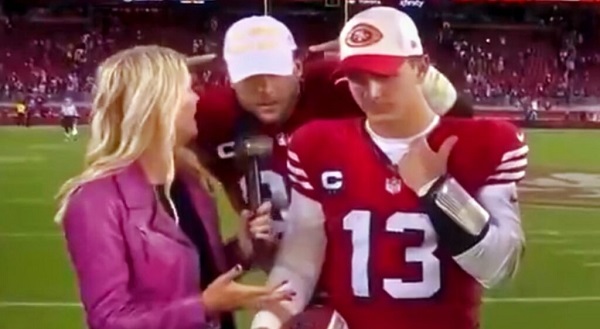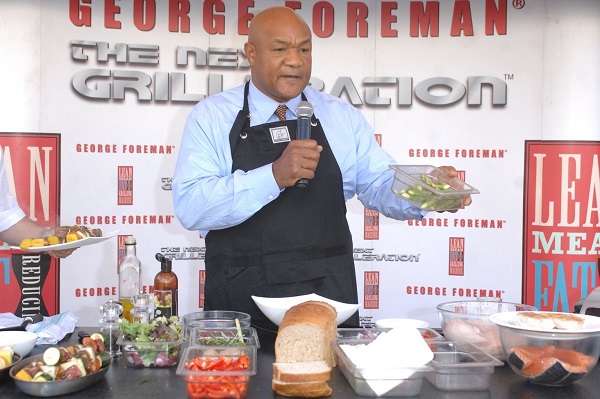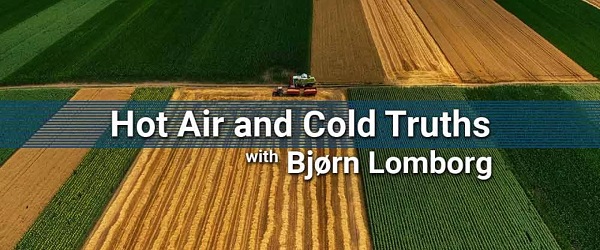Bruce Dowbiggin
Hat Trick: Nick Bosa’s Photo Bomb Re-Ignites The Colin Kaepernick Fury

For many this U.S. election can’t be over soon enough. The epidemic of the stupids still rages. (Anyone expecting resolution on Tuesday night better be in for a wait.)
Example: On last week’s Sunday Night football, San Francisco star Nick Bosa photo-bombed a postgame interview wearing a MAGA hat. (For some reason it was not the telltale red). He then quickly departed leaving his teammates and NBC reporter Melissa Stark to continue the usual bromides about team and character.
Predictably in this insane election season, Bosa’s drive-by political statement sent social media into an Elon Musk orbit. First were the demands that Bosa be fined by the NFL for political activity. Indeed the NFL can impose a $11,255 fine for “wearing, displaying, or otherwise conveying personal messages… which relate to political activities or causes.” (As of this writing, the NFL has yet to impose any sanctions against Bosa.)
Then there were butt-hurt Democrats. “I hope (49ers CEO) @JedYork trades Nick Bosa to Mar-A-Lago,” wrote Robert Rivas, Democratic speaker of the 29th District of the California State Assembly. “As a lifelong @49ers fan, I can say I’ve seen enough of Bosa in California.” And so on.

More telling were the Colin Kaepernick flashbacks to when he sat in 2016 during the national anthem to highlight his conversion to #BLM orthodoxy. “I better hear all the angry white people who told Colin Kaepernick to “shut up and play ball” or go “keep politics out of the NFL” outraged by this too. Like come on keep your energy or does it only count when you’re able to be racist?
“Two 49er NFL players. Two political statements. Black Lives Matter v. MAGA. Only one is allowed by the NFL.”
“Anyone remember when Nick Bosa called Kaepernick a clown for taking a political stance? Imagine being this much of a hypocrite,” another fan added.
Well now… we could make the point that photo bombing a political preference during an election is somewhat different from a high-profile convert to radical racial reparations disrespecting the national anthem in a non-election season. Here’s how we covered it in August of 2018.
For those who don’t remember the grievance, Kaepernick (who was raised by white parents) suddenly had a fit of conscience over the alleged slaughter of unarmed blacks by police. “I am not going to stand up to show pride in a flag for a country that oppresses black people and people of color. To me, this is bigger than football and it would be selfish on my part to look the other way. There are bodies in the street and people getting paid leave and getting away with murder.”
Which is his right, except unarmed black men in 2016, unarmed black men in 2024, are not being killed by police in the hundreds. (Most years it’s in single digits to 20 range in a population of 41 million blacks.) While tut-tutting about the gesture made on his employer’s time, the NFL declined to sanction Kaepernick. Which sparked copy-cat kneel downs and protests around sports, accompanied by the racial divisiveness typical of the Obama years.

His protest also coincided with his decline as a starting QB in the NFL (the 49ers won just two games in 2016). By 2018 Kaepernick was out of work in the NFL (after opting out of a contract from San Fran) and a full-blown BLM martyr. Nike gave him $ 3 million a year to spearhead their Woke campaigns. Netflix did a series on the ex-QB. Newly minted president Donald Trump decried the whole situation. Then Cowboys owner Jerry Jones— who’d knelt with players in Week One of the anthem controversy— threatened to bench any players who upstaged the anthem.
The NFL then passed a rule saying any players who wanted to protest the national anthem could do so in the locker room. That limp policy lasted just a few weeks. Protests during the anthem petered out as they lost their ability to shock. For the next years Kaepernick would claim he was blackballed (he reached a settlement with the NFL in 2019) and express his desire to play.
The 2020 George Floyd riots— after he died of a drug-induced heart attack while in police custody— pushed Kaepernick’s story to the side. He’s now done as a possible QB and the financial problems of BLM have made them a lesser player in the grievance cause. But it is fair to say Kaepernick made a choice to be a symbol for all multi-million dollar oppressed athletes and the radical Left has moved on without him.
So Bosa acting like a college sophomore to express a voting preference after a game compared to Kaepernick wanting a race-based social revolution in America? Mmm. These things are not like the other. It’s like accusing Chiefs tight end Travis Kelce of political interference for appearing with his girlfriend Taylor Swift, a vocal Kamala Harris supporter.

What is inarguable is the toxic Trump effect in pro sports such as football or basketball which have over seventy percent black players. It’s not just black players. Prominent white coaches such as Golden State’s Steve Kerr and San Antonio Spurs head coach Gregg Popovich go off about Donald Trump. Here’s Pop during a press conference: “He’s pathetic. He’s small. He’s a whiner… He’s a damaged man.”
As we’ve said many times, the left-leaning sports media piled on Trump as well. Former ESPN NBA insider Adrian Wojnarowski F-bombed Trump, TNT analyst and HoF player Charles Barkley said anyone voting for Trump was an “idiot” and award-winning host Bob Costas called him the “most disgraceful figure in modern presidential history” and his voters “a toxic cult”. So the messaging on Bosa vs. Kaepernick is supect at best.
We will update this column after we learn the results of the election (likely later this week). But for now let’s all be grateful that candidate Trump as political football is at an end. And the hysteria from Kamala Harris’ crowd can be re-directed to the border.
Bruce Dowbiggin @dowbboy is the editor of Not The Public Broadcaster A two-time winner of the Gemini Award as Canada’s top television sports broadcaster, he’s a regular contributor to Sirius XM Canada Talks Ch. 167. His new book Deal With It: The Trades That Stunned The NHL And Changed hockey is now available on Amazon. Inexact Science: The Six Most Compelling Draft Years In NHL History, his previous book with his son Evan, was voted the seventh-best professional hockey book of all time by bookauthority.org . His 2004 book Money Players was voted sixth best on the same list, and is available via brucedowbigginbooks.ca.
2025 Federal Election
Chinese Gangs Dominate Canada: Why Will Voters Give Liberals Another Term?

There’s an old joke that goes, the Japanese want to buy Vancouver but the Chinese aren’t selling. Glib, yes. But with enough truth— Chinese own an estimated 30 percent of Vancouver’s real estate market— to pack a punch; Especially in this truncated rush to anoint Mark Carney PM before anyone finds out exactly who’s his Mama.
The advertised narrative for this election is Donald Trump’s vote of no confidence in the modern Canadian state. A segment of Canadians— mostly Boomers— see this as intolerable foreign interference in the country’s sovereignty. So rather than look inward at why Canada’s closest partner is fed up with them the Liberal government has chosen a pep rally rathe than any uncomfortable questions.
Namely about Chinese interference in Canada’s politics, the distortion of real-estate prices in Canadian urban markets, the exploitation of banking and the thriving drug trade that underpins it all. And how it’s driving a wedge between generations in the nation. As we like to say, Canada’s contented elites have been sitting in first class for decades but only paying economy.
They’d like you to forget insinuations that Canada is a global money-laundering capital. Better to blame Trump for the “willful blindness” that has Americans and others losing trust in Canada to keep secrets and contribute its fair share tom protecting against the growth of China. (The same geopolitical concern that saw Trump kick the Chinese out of the Panama Canal Zone.)
Thanks to the diligent reporting of journalist Sam Cooper and others we know better. And it’s ugly. An estimated trillion dollars from Chinese organized crime has washed through Canada since the 1990s. They’ve used underground banks and illegal currency smuggling to circumvent the law. They’ve bribed and intimidated. And they’ve poisoned elections.
This penetration of the culture/ economy by well-organized Asian criminal gangs have been around since the 1990s, but under Trudeau they hit warp speed. By the time Trump inconveniently raised the issue of border security in January, Canada’s economy could fairly be characterized as a real-estate bubble with a drug-money-laundering chaser. The Chinese Communist Party now operates “police stations” in many Canadian cities to supervise this activity and report to Beijing.

In his 2021 book Willful Blindness (and subsequent reporting) Cooper patiently records this evolution with brazen Asian gangs using casinos in BC and Ontario as money-laundering outlets to wash drug money and other criminal proceeds, turning stacks of dirty twenty-dollar bills into clean hundred-dollar bills or casino chips. (When Covid closed the casinos they used luxury mansions as private casinos.)
All financed by underground banks and loansharks. This process became known internationally as The “Vancouver Model” to help establish Chinese proxies overseas and extend the CPP ‘s reach. Hey, the real estate kingpin is named Kash-Ing. (Kaching!) It’s currently being used to buy farm properties in PEI, much to the anger of residents (who will still vote Liberal to protect their perks.)
While investigators and some authorities attempted to expose the schemes the perps were protected by compromised government officials, corrupt casino employees and the inability of courts to deliver justice. It’s why Canadians were so shocked that TD Bank was fined $3B in the U.S. for allowing money laundering. “Not us! No way! We’re Simon pure”.
Much of this money ended up in Canada’s feverish real-estate market, with vacant properties creating insane price spirals across the nation. It’s driven the inability of under 40s to buy homes— another major crisis the Liberals are trying to disguise under Mark Carney the compliant banker. Still more of the proceeds were used to build stronger drug-supply chains between Asia, Mexico and Canada— with heroin and fentanyl then distributed to the U.S. and in Canada.

Against this explosion of housing and drug debt were stories of the political influence of these gangs into the Canadian system. The sitting Canadian prime minister, who praised the Chinese form of governing before he reached the PM post, has been seen in photos with underground Asian gang figures. As were previous Liberal leaders like Jean Chretien who made no secret of his lust for the Chinese market. Chinese money was used to build extensively in Chretien’s Shawinigan riding.
Donations to Trudeau’s Montreal riding association and to the Trudeau Foundation were favourites of shadowy Chinese figures. “In just two days (in 2016), the prime minister’s (Outremont) riding received $70,000 from donors of Chinese origin, and at the same time, the government authorized the establishment of a Chinese bank in Canada,” Bloc leader Yves-Francois Blanchet said on Feb. 28.
Donations to Trudeau from all across Canada constituted up to 80 percent of the riding’s contributions that year. In May 2016, one such fundraiser saw Trudeau hosted by Benson Wong, chair of the Chinese Business Chamber of Commerce, along with 32 other wealthy guests in a pay-for-access event. The patterns exposed by Cooper finally prompted a commission by Quebec justice Marie-Josée Hogue looking into Chines interference in Trudeau’s successful 2019 and 2021 elections.

An interim report released last year by Hogue determined that while foreign interference might not have changed the outcome of Canada’s 2019 and 2021 federal elections, it did undermine the rights of Canadian voters because it “tainted the process” and eroded public trust. So petrified was Trudeau of the full Hogue Report that he prorogued parliament for three months and handed in his resignation rather than test his 22 percent approval rating in a Canadian election. Or his luck with the courts.
Luckily for Liberals Trump came along to smoke out Trudeau and allow for the current whitewash of the party’s record since 2015 under Carney. So instead of agreeing with Washington about Canada’s corrupted economy Canadians have decided to engage in a Mike Myers nostalgia fest for a nation long gone. A nation overly dominated by its smug, satisfied +60 demographic that sits back on its savings while younger Canadians cannot get into the economy.
Reaching past the sunset media to those people is Pierre Poilievre’s task. He has a month to do so. For Canada’s long-term prospects he’d better succeed. The Chinese are watching closely.
Bruce Dowbiggin @dowbboy is the editor of Not The Public Broadcaster A two-time winner of the Gemini Award as Canada’s top television sports broadcaster, his new book Deal With It: The Trades That Stunned The NHL And Changed hockey is now available on Amazon. Inexact Science: The Six Most Compelling Draft Years In NHL History, his previous book with his son Evan, was voted the seventh-best professional hockey book of all time by bookauthority.org . His 2004 book Money Players was voted sixth best on the same list, and is available via brucedowbigginbooks.ca.
Bruce Dowbiggin
From Heel To Hero: George Foreman’s Uniquely American Story

“The more you learn, the more you realize how much you don’t know.”— George Foreman
For those who thought Donald Trump’s role progression (in WWE terms) from face to heel to face again was remarkable, George Foreman had already written the media book on going from the Baddest Man in the World to Gentle Giant.
It’s hard for those who saw him as the genial Grill Master or the smiling man with seven sons all named George (he also had seven daughters, each named differently) to conjure up the Foreman of the 1970s. He emerged as a star at the 1968 Olympics, winning the gold medal in heavyweight boxing. His destruction of a veteran Soviet fighter made him a political hero. In an age that already boasted a remarkable heavyweights Foreman was something unique.
Muhammad Ali, Joe Frazier, Ken Norton, Ron Lyle and Jimmy Ellis were still bankable household names for boxing fans— but on the downside of famous careers. They each had their niche. Foreman was something altogether different. Violent and pitiless in the ring. Unsmiling as he dismantled the boxers he met on his way to the top. He was the ultimate black hat.
With the inimitable Howard Cosell as his background track , he entered the ring in 1973 against the favoured ex-champ Frazier, coming off his three epic fights with Ali. While everyone gave Foreman a chance it was thought that the indomitable Frazier, possessor of a lethal left hook, would tame the young bull.

Instead, in under two rounds of savagery , Foreman sent Frazier to the canvas six times. Cosell yelled himself horse crying, “Down goes Frazier! Down goes Frazier!” This was a whole new level of brutality as the poker-faced Foreman returned to his corner as the most feared boxer on the planet. For good measure Foreman destroyed Norton in 1974.
Fans of Ali quaked when they heard that he would face Foreman’s awesome power in Africa in the summer of 1974. They knew how much the trio of Frazier brawls had taken from him. The prospect of seeing the beloved heavyweight champ lifted off his feet by Foreman’s power left them sick to their stomach. Foreman played up his bad-boy image, wearing black leather, snarling at the press and leading a German shepherd on a leash.
Everyone knows what happened next. We were travelling the time in the era before internet/ cell phones. Anticipating the worst we blinked hard at the headline showing the next day that it was a thoroughly exhausted Foreman who crumbled in the seventh round. The brilliant documentary When We Were Kings is the historical record of that night/ morning in Kinshasa. The cultural clash of Ali, the world’s most famous man, and the brute against the background of music and third-world politics made it an Oscar winner.
But it’s largely about Ali. It doesn’t do justice to the enormity of Foreman’s collapse. Of course the humiliation of that night sent Foreman on a spiritual quest to find himself, a quest that took the prime of his career from him. It wasn’t till 1987 that he re-emerged as a Baptist minister/ boxer. With peace in his soul he climbed the ranks again, defiantly trading blows in the centre of the ring with opponents who finally succumbed to his “old-man” power.
Instead of the dour character who was felled by Ali, this Foreman was transformed in the public’s eye when he captured the heavyweight title in 1994, beating Michael Moore, a man 20 years his junior. He smiled. He teased Cosell and other media types. He fought till he was 48, although he tried to comeback when he was 55 (his wife intervened)

And, yes, for anyone who stayed up late watching TV there was the George Foreman Grill, a pitchman’s delight that earned him more money than his boxing career. HBO boxing commentator Larry Merchant commented that “There was a transformation from a young, hard character who felt a heavyweight champion should carry himself with menace to a very affectionate personality.”
There was a short-lived TV show called George. There was The Masked Singer as “Venus Fly Trap”. And there were the cameos on Home Improvement, King Of The Hill and Fast ’N Loud, delighting audiences who’d once reviled him. He cracked up Johnny Carson.
Foreman’s rebound story was uniquely American. Where Canadians are enthusiastically damning Bobby Orr and Wayne Gretzky for political reasons, Foreman never became a captive of angry radicals or corporate America. He went his own way, thumping the bible and the grill. Rest easy, big man.
Bruce Dowbiggin @dowbboy is the editor of Not The Public Broadcaster A two-time winner of the Gemini Award as Canada’s top television sports broadcaster, his new book Deal With It: The Trades That Stunned The NHL And Changed hockey is now available on Amazon. Inexact Science: The Six Most Compelling Draft Years In NHL History, his previous book with his son Evan, was voted the seventh-best professional hockey book of all time by bookauthority.org . His 2004 book Money Players was voted sixth best on the same list, and is available via brucedowbigginbooks.ca.
-

 2025 Federal Election2 days ago
2025 Federal Election2 days agoPoilievre refuses to bash Trump via trick question, says it’s possible to work with him and be ‘firm’
-

 COVID-192 days ago
COVID-192 days ago17-year-old died after taking COVID shot, but Ontario judge denies his family’s liability claim
-

 Community2 days ago
Community2 days agoSupport local healthcare while winning amazing prizes!
-

 Alberta1 day ago
Alberta1 day agoAlberta Institute urging Premier Smith to follow Saskatchewan and drop Industrial Carbon Tax
-

 Business2 days ago
Business2 days agoWhile “Team Canada” attacks Trump for election points, Premier Danielle Smith advocates for future trade relations
-

 Alberta23 hours ago
Alberta23 hours agoAlbertans have contributed $53.6 billion to the retirement of Canadians in other provinces
-

 2025 Federal Election1 day ago
2025 Federal Election1 day agoFool Me Once: The Cost of Carney–Trudeau Tax Games
-

 Addictions1 day ago
Addictions1 day agoShould fentanyl dealers face manslaughter charges for fatal overdoses?





